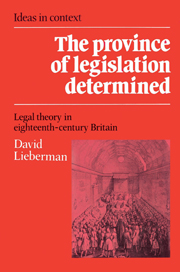Book contents
- Frontmatter
- Contents
- Preface
- Abbreviations
- Introduction
- I Blackstone and the Commentaries
- II The judiciary
- 3 Equity, principle and precedent
- 4 Legal principles and law reform
- 5 Mansfield and the commercial code
- 6 Common Law, principle and precedent
- 7 Kames, legal history and law reform
- 8 Kames and the principles of equity
- III Parliamentary statute
- IV Bentham
- Conclusion: The province of legislation determined
- Bibliography
- Index
3 - Equity, principle and precedent
Published online by Cambridge University Press: 10 October 2009
- Frontmatter
- Contents
- Preface
- Abbreviations
- Introduction
- I Blackstone and the Commentaries
- II The judiciary
- 3 Equity, principle and precedent
- 4 Legal principles and law reform
- 5 Mansfield and the commercial code
- 6 Common Law, principle and precedent
- 7 Kames, legal history and law reform
- 8 Kames and the principles of equity
- III Parliamentary statute
- IV Bentham
- Conclusion: The province of legislation determined
- Bibliography
- Index
Summary
The second part of this study provides a more detailed, albeit selective, exploration of that part of the English legal process for which Blackstone reserved his highest commendations: the common law system developed and administered by the judiciary. It focuses on the capacity of this system to respond to new social and legal needs, and on the theory of the judicial office which sanctioned such legal creativity. The story is pursued chiefly through a survey of the career of Lord Mansfield, Chief Justice of King's Bench from 1756 to 1788, and through an analysis of the legal ideas of the Scottish judge, Lord Kames.
In turning to the judiciary, we are still attending to that body of legal doctrine concerned with the proper relationship between common law and statute. Indeed, the practice of the courts both reflected and lent crucial support to those who construed the relationship in such a way so as to restrict the scope of parliamentary action. Thus the emphasis remains the Blackstonean one of placing the claims of common law somehow against the statute book. Nevertheless, our primary concern is not with instances of the courts acting against statutory interference. Instead, interest centers on the courts' handling of its own common law rules, often in areas of law where legislation had had little impact.
- Type
- Chapter
- Information
- The Province of Legislation DeterminedLegal Theory in Eighteenth-Century Britain, pp. 71 - 87Publisher: Cambridge University PressPrint publication year: 1989

